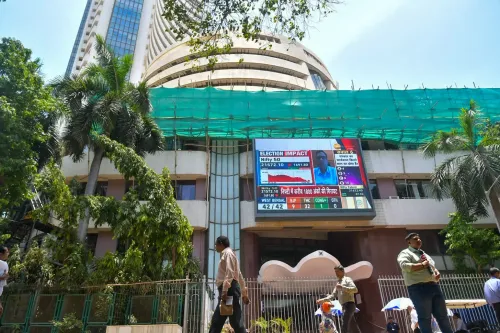TCI-IIMB's GHG Emission Tracking Tool Achieves ISO Certification
Bengaluru, Dec 20 (NationPress) The TCI-IIMB Supply Chain Sustainability Lab at the Indian Institute of Management Bangalore (IIMB) has made history by becoming the first entity in India to earn the ISO 14083 certification for its pioneering digital platform, the Transportation Emissions Measurement Tool (TEMT).
Established in partnership with the Transport Corporation of India (TCI), the TCI-IIMB Supply Chain Sustainability Lab is at the forefront of promoting sustainability.
This certification highlights the platform’s proficiency in accurately measuring and reporting greenhouse gas (GHG) emissions resulting from freight transport activities, enabling organizations to assess, manage, and ultimately decrease their transportation-related emissions in accordance with regulatory mandates and sustainability objectives.
To initiate substantial action towards reducing emissions, organizations require robust measurement tools. The TEMT, equipped with certified emissions factors applicable to various transport modes, empowers organizations to precisely quantify and report emissions, laying the groundwork for effective emission-reduction initiatives.
In India, the transportation sector contributes approximately 14 percent of the nation’s total GHG emissions, with freight transportation responsible for nearly 40 percent of carbon dioxide (CO2) emissions within this sector.
In the absence of intervention or cleaner technologies, transportation emissions are anticipated to quadruple from 2016 to 2050, potentially hitting 1.17 billion tonnes of CO2 by 2050, which would elevate the transport sector’s share of total emissions to 19 percent. Accurate measurement is a vital first step in addressing these emissions.
ISO 14083, formulated by the International Organisation for Standardisation (ISO), establishes a worldwide standard for quantifying GHG emissions from transport operations.
This standard is relevant for various transport modes, such as road, rail, air, maritime, and inland waterways, encompassing both fuel combustion and electricity consumption. It delineates calculation methods, data prerequisites, and reporting standards, providing a standardized approach to tracking emissions and enabling organizations to make informed emission-reduction decisions.
Moreover, NICDC Logistics Data Services Limited (NLDSL), a subsidiary of the National Industrial Corridor Development Corporation (NICDC) under the Department for Promotion of Industry and Internal Trade (DPIIT), Ministry of Commerce and Industry, has incorporated ISO 14083 emission factors API into its flagship initiative, the Unified Logistics Interface Platform (ULIP).
This integration allows users to effortlessly compute emissions from freight operations, enhancing transparency and sustainability in logistics.
Girish Kumar Surpur, CEO and Director of NICDC Logistics Data Services, emphasized that as NLDSL advances towards a sustainable future, ULIP’s Carbon Emissions API, developed in collaboration with the TCI-IIMB Supply Chain Sustainability Lab at IIM Bangalore, empowers trade and logistics entities to assess the environmental impact of their transport activities.
By calculating emissions and leveraging additional data resources available with ULIP, companies can now create the necessary tools for informed, actionable sustainability decisions, including modal shifts. Together, we can catalyze meaningful transformation towards a lower-carbon logistics ecosystem.
The TEMT is a thorough online tool designed to measure emissions across all transportation modes. It integrates India-specific emissions factors, validated through ISO 14083 certification, to ensure data precision and relevance.
The platform enables users to calculate emissions for both past and prospective shipments and compare emissions among different transport modes for a specified origin-destination route. Additionally, it offers users the flexibility to create customized transportation chains, with all previous entries securely stored in the cloud for effortless monthly tracking and annual comparisons.
This tool is commodity-agnostic, meaning it is applicable to all shipment types.








